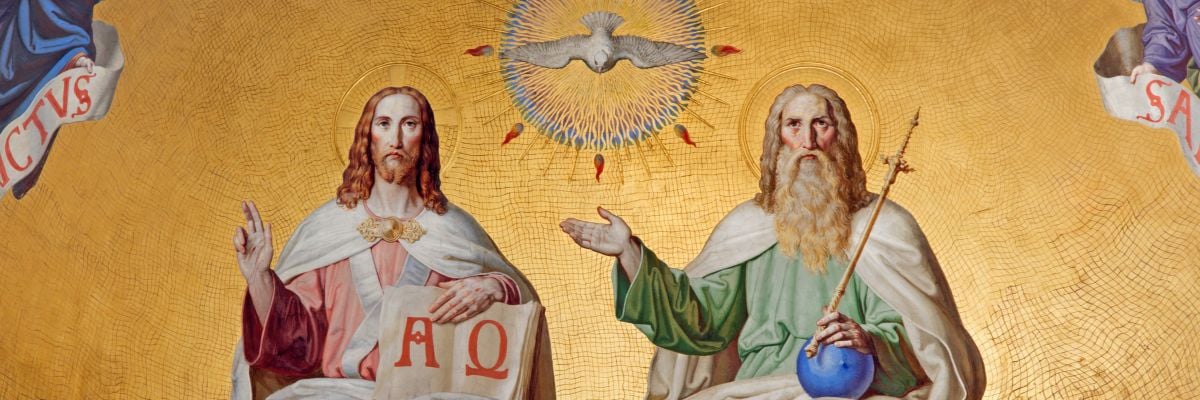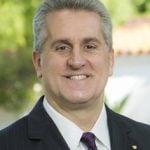
Tim Staples cites arguments from Scripture, ecumenical councils, and the papacy to explain the Roman Catholic doctrine that the Holy Spirit proceeds from both the Father and the Son.
Transcript:
Host: We go now to Kazik in Williamsburg, Virginia watching on YouTube but getting in touch with us over the phone. Kazik, you are on with Tim Staples.
Caller: Hello. I just really want to say how much I appreciate you doing this, especially with the conversation you had earlier about the Eucharist. Coming from an Eastern Orthodox perspective, I just can’t say how much I appreciate that.
Tim: All right, brother.
Caller: But while I agree with you on those things, there are a couple things I object to in my Eastern Orthodoxy, one of them being the filioque. And I would just like you to comment on that, if you can.
Tim: Sure, sure. Yeah Kazik, I actually wrote an article for Catholic Answers Magazine, you can find it online at Catholic.com, called “Defending the Filioque.” You might want to check that out at Catholic.com, I go into great detail there. But basically, Kazik, I find the filioque to be absolutely Biblical.
Yes, as you know, Jesus Christ taught that the Holy Spirit proceeds from the Father, you and I agree when it comes to that; but we also find, for example–and I give you many biblical texts in my article, but for example in Revelation 22:1-2, we have an image where Saint John is looking at Heaven, and what does he see? He sees the Father and the lamb sitting on the throne, and a river of life proceeds from the Father and the lamb, giving life to everything around it. And of course that water is a symbol of the Holy Spirit, as we know in John chapter 7–the same John who wrote the Gospel of John wrote the book of Revelation–and Jesus talks about the Holy Spirit as being a river of living water that comes out of the belly of those who believe in Jesus. So there’s that and many other reasons we could look at.
Jesus Himself also says, “I will send the Holy Spirit from the Father,” which indicates both Father and Son are involved in the sending of the Holy Spirit. Now, there’s a lot of theology that goes into that, but I think number one, Kazik, in my study of this many years ago–in fact, I considered Orthodoxy, Kazik, before I became Catholic–but I found the Catholic position to be absolutely Biblical.
And then as a matter of history, we see, you know, this was taught East and West; you have St. Clement of Alexandria, you have the Alexandrian school of theology that taught the filioque, and that’s Eastern Christians. St. Didymus the blind, for example, who was one of St. Jerome’s teachers, I mean, in some sense you could say that perhaps St. Didymus taught St. Jerome the filioque in that sense.
But, you know, you have Eastern fathers who clearly taught it, you have Pope Leo the Great who taught it dogmatically in 447 AD; that’s very significant because that’s before even the Creed of 381 was received and approved by the Bishop of Rome. Kazik, as you may know, the Council of Constantinople was not originally approved by Pope Damasus because of some of the machinations that went on at the council, with the patriarch of Constantinople attempting to kind of leapfrog over the bishops of Antioch and Alexandria to make himself number two.
And I always find that interesting, Kazik, that at Constantinople there was no question who was number one. That was not even a question. It was a question of who was going to be number two, and because of the fact that Constantinople did not have an apostolic origin–it came later–Pope Damasus said “No,” and so that kept Constantinople from being approved as a council, and the symbol or the Creed of Constantinople of being approved either, even through the Council of Ephesus up until the Council of Chalcedon.
And an interesting point, Kazik, I found when I studied this, is that if you go to the documents of Chalcedon after Chalcedon, and of course Pope Leo’s tome was read, and the matter of Monophysitism was was put to rest, you know, and the council fathers erupt and say, “Peter has spoken through Leo, the matter is at an end,” it was the patriarch of Constantinople, Kazik, who writes to the Bishop of Rome, begging him to approve not only Chalcedon, but also Constantinople. Seventy years they had been waiting, and of course Pope Leo famously ratifies both, allows Constantinople to be leapfrogged up to the number two position.
But the–see, Kazik, I mean, we could talk forever about this, but the bottom line is, when when I first read this history and I read the councils, I’m finding the Bishop of Rome and his authority sticks out like a sore thumb. And, you know, I’ve talked to Orthodox folks about this and I did back then, and to me, Kazik, it is airtight. Now it is true, there was a big blowup over the filioque, some in the East did not understand. I believe a lot of it was semantics; in fact, some few Orthodox bishops, even today–in fact, in my article I quote one of them who acknowledges that we’re dealing with, really in essence, semantics here.
But the filioque really does not change in one bit. It develops our understanding of the Trinity, but it does not contradict the fact that the Father is the first principle of life in the Trinity. I mean there were some in the East, Kazik, as you know, who were saying “Roman Catholics’ baptisms are invalid because they’re saying there’s more than one God, because there’s two principles, two, you know, first causes,” and all of that is mythical. A lot of that was because of poor communication between a Latin-speaking West and a Greek-speaking East, and really that stuff has been cleared up.
We’re not denying that the Father is the first principle of life in the Trinity. We’re simply saying–I like the way my friend Dave Armstrong explains it so simply. I always use a communication between two persons, but I like the way Dave Armstrong explains the filioque like this: we’re talking about–think of the Trinity as a game of catch, okay? The Father is the first principle. He gets the ball, says, “Son, we’re going to have a game of catch.” He throws the ball. He is the first principle of life in the Trinity. But without the Son to catch the ball, you ain’t got no game of catch. Okay? The Holy Spirit IS the game of catch, that proceeds from the Father and the Son. I love that.
I’ve always used, you know, a dialogue between persons, and it gets a little bit more fancy-schmancy, but I love Dave Armstrong’s. It’s a real simple way to communicate the truth of the filioque. I hope that helps, Kazik.
Caller: Yeah, helps a lot.
Tim: All right, I really appreciate your call my friend, stay in touch because you’ll find a lot of stuff on Catholic.com concerning East-West relations. I personally have a great love for the Orthodox churches, they are so close to us.



